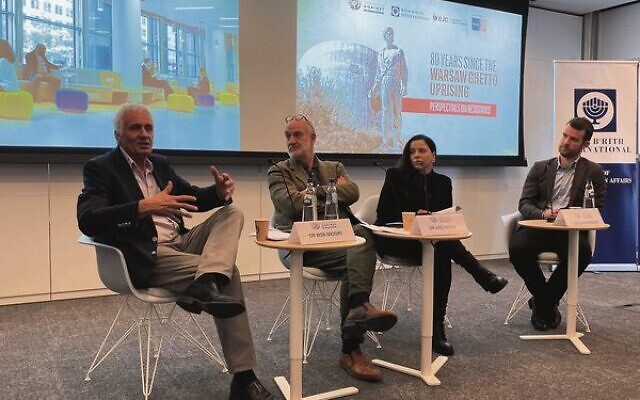Australian BBC journalist making waves
Australian-born BBC journalist Amie Liebowitz recently moderated a high-profile panel on the topic of Jewish resistance at the European Parliament.

Australian-born BBC journalist Amie Liebowitz recently moderated a high-profile panel at the European Parliament on the topic of Jewish resistance.
Co-organised by the European Jewish Congress and B’nai B’rith International, the event was held to commemorate the Warsaw ghetto uprising.
The panellists discussed the concept of resistance in the contemporary world and the lessons that can be drawn from the Warsaw ghetto uprising to the present day.
“Our aim was to get into the theme of resistance and allow MEPs [Members of the European Parliament] and other journalists, civil actors and activists to learn more about the history and how it’s currently applicable to our lives today through an interdisciplinary lens,” Liebowitz told The AJN from Brussels.
Liebowitz attended Killara High in Sydney, before obtaining a BA in Asian studies, and government and international relations, and an MA in international security from the University of Sydney. Journalism wasn’t her first calling, but she has begun to make a name for herself covering Nazi-related stories.
“I used to volunteer for AUJS during my undergrad, which helped me form a lot of views about politics when I had felt indifferent prior,” Liebowitz said.
As an Asian studies major, Liebowitz initially intended to move to Seoul on exchange, but a funding issue meant she didn’t end up going. She then travelled to London to pursue journalism and has gone on to cover conflict, terrorism and, in particular, Nazi war trials and neo-Nazi incidences and trials.
“I noticed a gap in knowledge among my peers about the Holocaust and antisemitism, and started to answer their questions, or speak up when I saw inaccuracies,” Liebowitz said.
“At first I just covered things I found interesting, like the event Jewrovision, but I think ultimately I cover the far-right and Nazi trials in Europe because I’ve seen firsthand how it affects people close to me. Some of the best feedback I get is, ‘listening to your piece made me stop and tear up in the supermarket,’ and that’s the effect I want to have.”
Liebowitz has also produced a WWII podcast for BBC Radio 4, which will be released in the coming weeks.
“I can’t say much, but I think it will change some people’s perception of war and conflict,” she said.
“It’s not sanitised and I think people need to see the harsh reality of what war and its after-effects can look like.”

comments